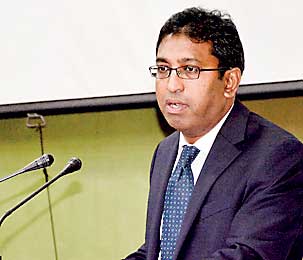Wednesday Feb 04, 2026
Wednesday Feb 04, 2026
Wednesday, 7 October 2015 00:10 - - {{hitsCtrl.values.hits}}
By Madushka Balasuriya
Deputy Foreign Minister Dr. Harsha De Silva wants Government officials to call a truce on “turf wars” and work together in helping the country reach its economic goals by aligning foreign and economic policies to present holistic growth opportunities.
Dr. De Silva was spe aking at a forum titled ‘Explore the global markets and grow your business through the use of Government channels’.
aking at a forum titled ‘Explore the global markets and grow your business through the use of Government channels’.
“A country’s economic policy and foreign policy must be coordinated. You can’t have an economic policy with an export focus and a foreign policy that says ‘who cares about the EU?’ We can’t be at cross-purposes. Unless we align our economic policies and foreign policies, we can say bye-bye to our export dream.”
The Deputy Foreign Minister – formerly Deputy Minister of Policy Planning and Economic Affairs – added that it was crucial for Sri Lanka’s economic and foreign policies to be aligned in order for there to be an improvement in the export industry. He charged that under the previous regime this had not been the case.
“How can we work together? Let’s keep the turf wars aside. It doesn’t matter whether you’re sitting at the EDB, the Commerce Department, the BOI, the Foreign Office or some embassy; all these people as the agents of the Government are ultimately responsible to the government of the day, and the government of the day is ultimately responsible to the people,” he said to an audience, which included Chairman of the Export Development Board Bandula Egodage, and Director General of the Department of Commerce Sonali Wijeratne.
One of the main consequences of the ‘cross-purpose’ planning by the previous regime was the loss of GSP Plus in 2010 for trade with the European Union (EU). The ‘Generalised Scheme of Preferences’ allows developing country’s exporters to pay less or no duties on their exports to the EU. The previous regime claimed that the loss of GSP Plus would not have a negative impact on the Sri Lanka population, and refused to be bowed by the threat of sanctions.
De Silva disagreed. “The first scientific paper on GSP Plus has just been published: ‘The garment industry in Sri Lanka and the removal of GSP plus by the EU.’ It is an empirical, data-based, technical, scientific paper published in a very well-respected peer-reviewed journal. It says that the loss of GSP Plus had a huge negative impact on the people of this country. That poverty reduction targets couldn’t be met. GDP growth fell. Exports fell.”
He explained that the Government at the time didn’t do anything to rectify the matter but that with newly-aligned foreign and economic policies, the current regime is well on course to regaining GSP Plus status.
“I think before the end of the year we will be making the formal application and hopefully by middle of next year we will be able to bring in GSP Plus,” assured De Silva, who recently revealed that Germany would be giving Sri Lanka complete backing in regaining GSP Plus.
“The Director General of Commerce and her staff who have been working on this with a lot of dedication over the years will now have the opportunity hopefully to get this GSP Plus benefit brought back to the exporters who can benefit from it,” he added.
However, De Silva noted that even with the return of GSP Plus, all of Sri Lanka’s travails would not be lifted; a streamlined economic plan will still be needed. He pointed to Australia’s “four pillars” of trade, investment, jobs and business, and how the Sri Lankan Government’s new tact of ‘economic diplomacy’ could be used on that front.
“I’d like to see if the foreign office can focus on taking Sri Lankan businesses overseas. The ambassadors I meet in Colombo have a singular focus – economics, trade, investment,” noted De Silva, referring to his various experiences with foreign diplomats. “Every time you meet an ambassador, they don’t talk about cultural exchanges. By and large it’s about an investment opportunity, it’s about a project, it’s about trade.”
He explained that “as Foreign Service officers, our ambassadors, our high commissioners, our first secretaries, our commercial people should speak the same language,” and that he and Foreign Minister Mangala Samaraweera are working “urgently” towards this.
“As a start what we have done at the Foreign Office is try to talk about it, get the technical words more comfortable to be spoken among the people at that office and then our missions overseas. Rest assured the Foreign Minister and I will do whatever is necessary in the Foreign Ministry in the months and years ahead to make sure that our network of officers across the world, and also our policies, are crucial in ensuring that exports growth will be looked at with a lot of importance and urgency,” he added.